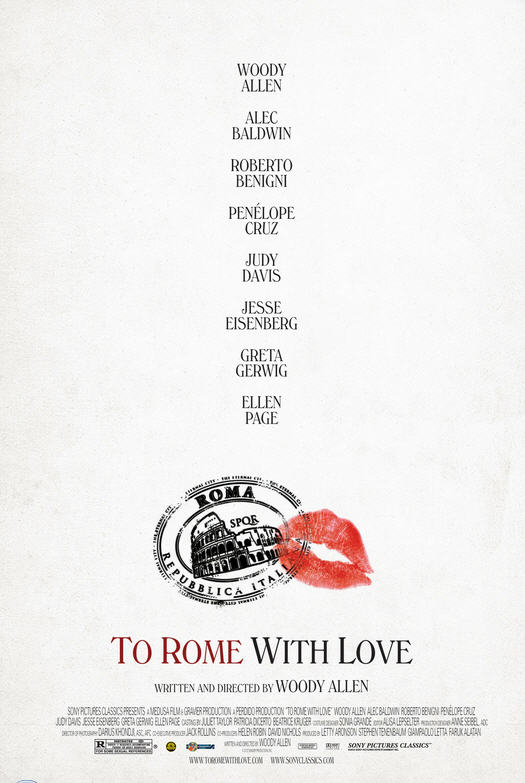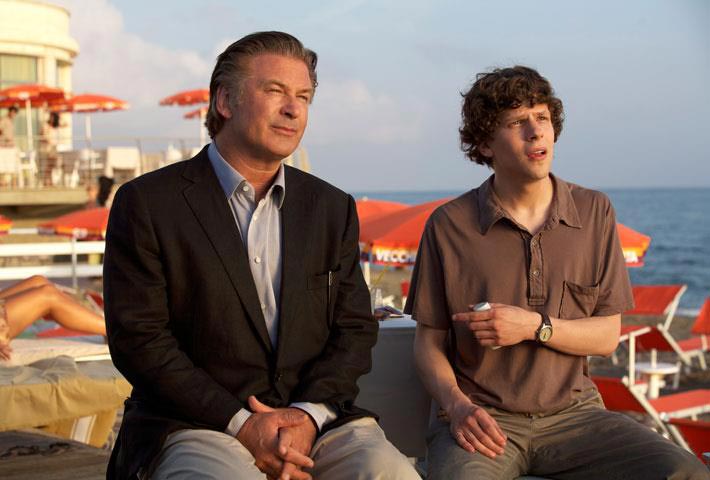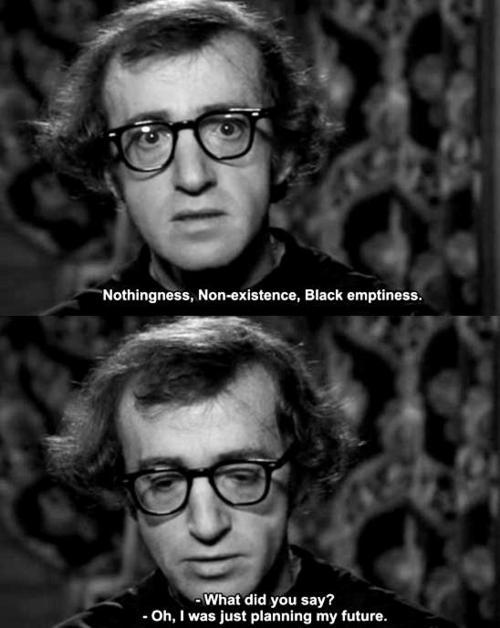10. Childhood memories (Wild Strawberries, Ingmar Bergman, 1957)
In my humble opinion, the final scene of Bergman's Wild Strawberries is one of the most perfect endings a film could have. Professor Isak Borg (Victor Sjöström) is a man nearing the end of his life. He evaluates his life in a series of dreams and asides, putting his accumulated years into perspective. What I like about this scene is that it focuses solely on the professor. No one else; just him. It is in our private moments where we are most honest. I connect to the scene because I consider my childhood the best years of my life to date. Everything that has followed it just hasn't been as exciting. I have an abundant bank of childhood memories, and although I am not as well-travelled as Isak, I still call on them when I need to smile.
9. Subway attraction (Shame, Steve McQueen, 2011)
I was having doubts over whether I should include this scene in the post. I was afraid it would make people perceive me as a stalker, or at least a creep. Well, I am neither of those things, but one thing I am is a frequent user of public transport, and this sort of eye contact is something that happens a lot. It's very subtle flirtation, and it can make make a boring train ride become quite interesting. Of course, if the eye contact is not reciprocated, or if I sense I'm making the woman uncomfortable, I drop it straight away. Also, I don't follow women once they alight the train, like Brandon (Michael Fassbender) does in this clip. It's just a bit of harmless fun for me. For those who haven't seen the movie, Brandon is a sex addict, and so his desires are a lot stronger than mine.
8. Institutionalised (The Shawshank Redemption, Frank Darabont, 1994)
No, I have never been to prison, and I don't intend on ever being locked up there. However, I like to adapt the metaphor of institutionalisation and apply it to school life. Primary school and high school induce routine in our lives. We know at what time the morning bell will ring. We know when recess and lunch are. We catch the same bus to and from school each day. Everything runs like clockwork. But one day, it all comes to an end. Your final exams are over and you've graduated. You'll never have that again. I know a lot of people openly admit to hating their years as a school student. Usually, it's because they were bullied. I can understand that. I don't miss school a whole lot, but I miss the routine of school. Once school is over, life has a habit of throwing surprises in your face, and they aren't always pleasant. I also relate to the idea of institutionalisation because I am an introvert. The four walls of my bedroom were once very drab confinements. Ever since I accepted that I spend so much time at home, they've become second nature to me. Homesickness is a frequent problem of mine.
7. Typewriter tantrum (The Shining, Stanley Kubrick, 1980)
When I write, momentum is key. While I won't berate someone in the fashion that Jack Torrance berates his wife, I can certainly understand why Jack is so angry in this scene. If I lose my train of thought, I find it really difficult to get back on track. This scene works really well because of the contrast between the docile Wendy Torrance and her temperamental husband, Jack. You'll connect with the scene if you're an individual worker or a reclusive type.
6. The Colonel's kiss (American Beauty, Sam Mendes, 1999)
Firstly, I can't believe Chris Cooper didn't get an Oscar nomination for this role. Now, as you should all know by now, American Beauty is my favourite film of all time. Is this my favourite scene in the film? Probably. I can't say for sure. What I am sure of is that the scene taps into the fundamental human truth that we've all had "the wrong idea" at one time or another. Sometimes it seems as though the evidence is right in front of our eyes. Our selfishness entices us to a conclusion that turns out to be false. There was a time in my life when I got the wrong idea. I was so certain about something...someone, but my conviction was little more than idealisation and wanting to believe in another reality. I can't go into more detail than this. It is something I am very ashamed of and try to forget.
5. "I sound my barbaric yawp!" (Dead Poets Society, Peter Weir, 1989)
I have always been the shy one. This shyness means I am often lacking in confidence. "I'm just not good enough," I tell myself quite frequently. My teachers at school told me I had a lot of untapped potential. I could be the great student if I wanted to be. I just didn't try to be. Heck, I didn't even want to be. This scene shows us how we often rob ourselves of self-discovery because we live idle lives, and that some of us treat life as a 'waiting game', always expecting things to happen, but not actually pursuing opportunities. This is exactly how I view life. I live in the moment. I have no ambition. I have a profession in mind, but I have no idea how far I want to go with it. Maybe I just need a great innovator to shake me up and demand I sound my barbaric yawp.
4. "Do you realise what a thread we're all hanging by?" (Hannah and Her Sisters, Woody Allen, 1986)
Not too long ago, I wrote about the search for meaning in my life. If that was too much for you to read, here are my basic thoughts on the subject. Life is such a depressing endeavour because everyone eventually dies. In order to keep our minds off this thought and prevent ourselves from committing suicide, we must pretend that this all means something by inventing distractions for ourselves. Sometimes the distractions are genuinely pleasant and we can derive personal meaning from them. When I watched this movie, I COULD NOT BELIEVE how accurately my beliefs were portrayed in this scene. A doctor tells Mickey (Woody Allen) that he doesn't have cancer. Mickey runs out of the doctor's surgery and does a victory dance in the street, until he realises that, while he may not die anytime soon, he will die eventually. Like Mickey says, death is something we know about all the time, but we stick at the back of our minds. For a lot of people, the inevitability of death is what makes the idea tolerable. It's the opposite for me. I often fantasise that scientists will one day invent a remedy for death. Of course, I make these thoughts in jest, but it would be nice. I just hate the fact that I'm going to die one day. For fuck's sake. Why?
3. "I am not gifted." (Vicky Cristina Barcelona, Woody Allen, 2008)
It's obvious that I'm very passionate about film, but if you asked me to actually make a film myself, I'd laugh at you. I'm just not gifted enough to make one. I know, I know. I could take a course in filmmaking. But you know what? I'm just not bothered. I have no drive. I am not like the self-taught François Truffaut, who, in his childhood, snuck into theatres because he couldn't afford to view the art form he would one day contribute to. If I had to pinpoint something that's remotely close to a gift, it would be my control of language. Not writing, per se, but just the way I generally use words to express myself. But, in today's society, is that a truly remarkable gift? Will it take me anywhere? I have doubts about that. I just wanted to hug Cristina (Scarlett Johansson) in this scene. I share her pain on a daily basis. I love art, music, film and literature, and I have so many interesting thoughts to share with the world. It's the medium of delivery I struggle with. I'm not as talented as the people I admire. This blog is the best hope I've got. I think I could write a screenplay if I really had to...but that's for another day.
2. "I can't relate to 99% of humanity." (Ghost World, Terry Zwigoff, 2001)
This is only a brief scene, but it encapsulates what I think about a large portion of society. Sometimes I call myself a misanthrope. Human beings just really disappoint me sometimes. We're vain and greedy creatures. Like Seymour (Steve Buscemi), I just cannot fathom why some people cannot be comfortable unless they're wearing expensive Nike footwear. The majority of people my age seem to coast along and cling to whatever will make it easy for them to be liked. Some people are happy to listen to whatever music is in the mainstream charts, and they will not cop a hard time for it because this music saturates popular media. Some people can watch the latest Transformers movie for nothing but pure entertainment, and no one will ridicule them because seeing movies as more than mindless fluff is “pseudo-intellectualism”. Sometimes I hate being smart. And yes, I believe I am smart. People have been telling me this my whole life. I can’t avoid it. Sometimes I wish I was predisposed to be a simple-minded guy with safe tastes and safe opinions. But that’s not how I’m wired. I’ve always been inquisitive and I’ve always been pedantic. I believe this is more difficult than being a moron, if only for the fact that morons have less explaining to do.
1. "This is important to me." (Diner, Barry Levinson, 1982)
I'm a very pedantic person. I like things to be organised meticulously. I probably have obsessive-compulsive disorder but just haven't been diagnosed. If I have things arranged in a specific order, and someone tampers with that order, then I will be angry. But this scene isn't just about people who like to order things. This scene is about caring so deeply for something that no one else understands. For me, that thing is correct spelling, grammar and punctuation. I don't care if I'm on Facebook. I'll use the language as it was intended to be used. Hardly anyone can understand why I object so strongly to bad spelling. I hate it because it’s incorrect and it looks ugly. Why butcher a language like that? Still, no one can fathom how frustrating it is to me. So, I am left alone to ramble into an echo chamber. Because of this, I fear that people secretly hate me. If they do, that's their problem. I'll keep inserting the apostrophes that people carelessly discard because they "cbf". When I was five and my grandmother sat me down and taught me how to spell my own name by pointing to a football with "STEVEN" written on it, she did it because she cared. She didn't have to do that. When someone writes 'your' instead of 'you're', I might correct the person. If that person responds with "Who cares?", it sets me off. "I CARE!" Isn't it fucking obvious that I care? I corrected you for your own good, because I care. And I'm not going to pretend that I have a perfect grasp of the English language. I'm sure there would be people who care about these things even more than I do, and they are most welcome to correct me. I encourage it. If you would like to read more about my reasons for caring about the correct use of language, I've written about it here. In the meantime, don't be afraid to stand up for the things you care about, and don't worry if no one understands your love for it.





